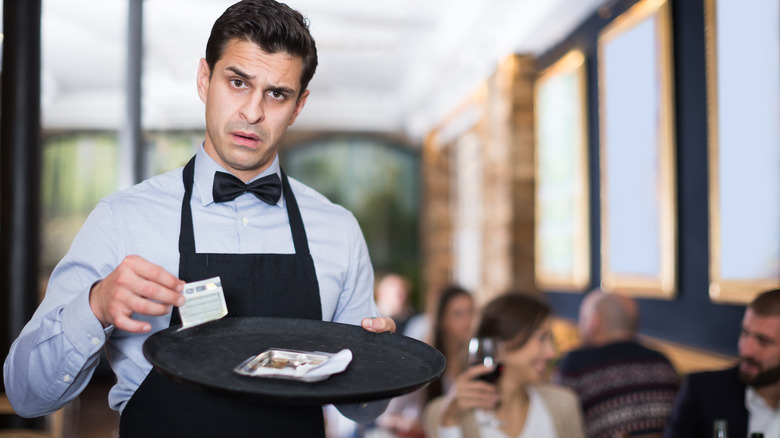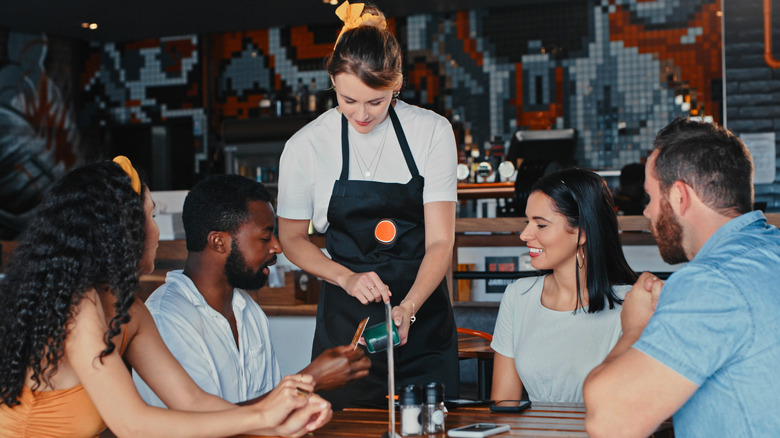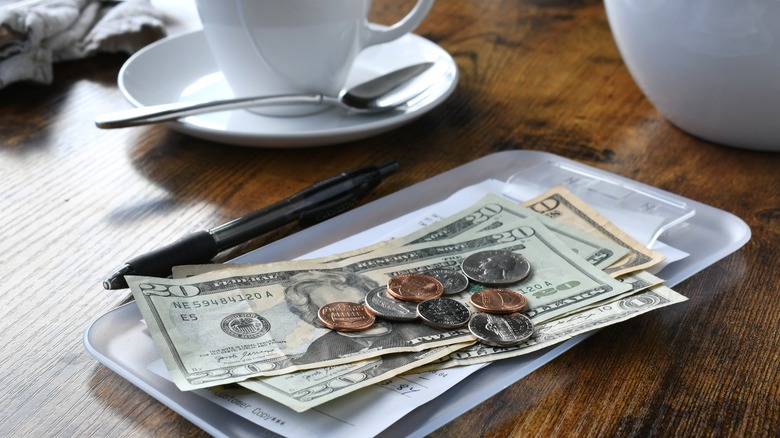The Etiquette Rule To Keep In Mind When Dining With Bad Tippers
Having dinner with people known to be bad tippers can lead to cringe-worthy moments. It can also prove to be expensive if you try to compensate for their lack of generosity with added gratuities of your own.
Is adding extra money the right way to handle the situation? Etiquette dictates that restaurant service staff should be tipped at least 15%, although many would argue that 20% is more appropriate. In the U.S., workers rely on tips due to a lower-than-average minimum wage. So, making up for a bad tipper at your table, as a general rule of thumb, is the right thing to do. However, you shouldn't have to make a habit of subsidizing the tips of others. If the bad tipper in question is someone you dine with frequently, you'll probably want to have a conversation with them about it at some point.
We say "probably" because there are contexts where this conversation could be more than just a little awkward. Telling your boss that his tipping etiquette needs work, for instance, is likely not going to be well-received. In hosted dinners, too, it's considered inappropriate to add to the initial gratuity, or to communicate with the host regarding proper tipping percentages.
How to politely correct a bad tip
Yes, it is appropriate to correct a bad tip so that the restaurant service staff is properly compensated. Dining etiquette has evolved to promote respect and consideration towards others, including the server who is taking care of your table. Service staff depend on tips for their livelihood.
However, there are a few dos and don'ts to keep in mind, as it's also important to be respectful towards those with whom you're dining, even if they aren't very good tippers. For example, it's not recommended to declare loudly that one of your dining partners is not contributing enough on a shared check. Nor is it advisable to simply grab the check to avoid embarrassment.
There should be an opportunity as your group gets up from the table to quietly add a bit extra to the gratuity, if necessary. Directly handing money to the server, as long as it is unobtrusive and doesn't embarrass anyone at your table, is also an acceptable way to remedy a bad tip.
How to have a conversation with a bad tipper
If someone you dine with frequently is undertipping, then a conversation about it may be appropriate. However, this conversation requires delicacy, and should not take place in a restaurant.
After all, you don't want to offend someone with whom you have a relationship by criticizing them. That's why it's best to bring up the topic in another setting, and casually if possible. Recalling a recent restaurant experience can provide an opening to inquire about their tipping habits, and whether there was an issue with the service that affected it. If bad service is cited, you might point out that most things servers are blamed for aren't their fault (such as cold food, or a lengthy wait time for a table, for example).
There are many people, including some in the restaurant industry, who believe the tipping system in the U.S. should be changed. Some restaurateurs have even weighed in on the no-tipping debate by instituting no-tipping policies. But in most restaurants, tipping is still an essential form of compensation, and typically accounts for over half the income of the servers who work there. Explaining these facts, too, may help in improving the tipping habits of your more frugal dining partners.



